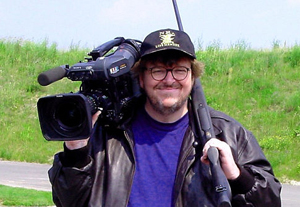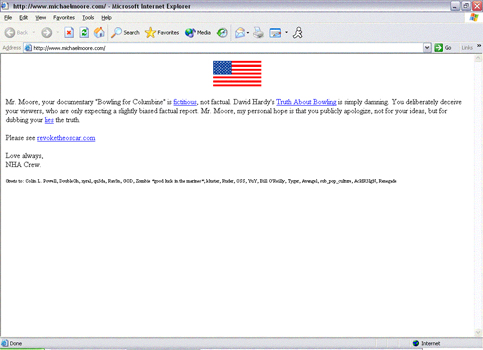
+ + + + + + + + + + + + + + +
I eventually borrowed a copy from my local library. By then, I had heard so much about the film and seen so many excerpts of interviews, I already knew the most surprising parts of the film: The campaign against K-mart selling ammunition, the interview with Charlton Heston, etc. I knew that the movie wasn't about Columbine as much as it was about living in a nation where the gun is the rule... or so the film would have the viewer believe.
 I have mixed feelings regarding Bowling for Columbine. After seeing it, I find that it bothers me to know there are teachers in other countries who use the film to illustrate what American life is like (I have been told this by more than one person outside of the USA). It's not how I see the United States. Yes, we have a high level of domestic gun-related violence, but just about every place has extremes -- and extremists.
I have mixed feelings regarding Bowling for Columbine. After seeing it, I find that it bothers me to know there are teachers in other countries who use the film to illustrate what American life is like (I have been told this by more than one person outside of the USA). It's not how I see the United States. Yes, we have a high level of domestic gun-related violence, but just about every place has extremes -- and extremists.That said, I did find valid points in the film. It was difficult to watch at times, particularly when they talked with survivors of school shootings. Moore's interview with Kayla Rolland's teacher was particularly depressing. Kayla was a first-grader who was just six years old when a classmate - also six - brought a gun to school and shot her while they were lining up to leave the classroom. She died within minutes; she bled to death on the floor of her classroom while her classmates stood over her.
I followed that case back when it happened, and was gripped again with just how young the kids were. There was no malice in the shooting. It was obvious the shooter wasn't even fully aware of what he had done, and had no concept of death. I can scarcely imagine what it must have been like for Kayla's parents, to lose a child so young and violently in a place where a parent's worst worry should be skinned knees and strep throat.
The part of the film that featured Charlton Heston was also sad. As a child I loved him in Ten Commandments and grew up thinking of him as Moses. I still have a geeky soft spot for him in Planet of the Apes. In 1999, the NRA had their convention scheduled in Denver. At the time I thought it was uncouth and insensitive of them to go ahead and hold it there despite the shooting. Columbine wasn't just some bomb threat at school; people died. Kids died.
Since then I've learned a lot about the nature and logistics of big events. Trying to move a rally of that size in under three weeks would have been virtually impossible. So would canceling. To get the word out to everyone involved alone - guests, attendees, vendors, and the venue, and, and, and... it would have been insurmountable. Legal red tape on several fronts prevented change on such short notice.
However, I did think it was out of place for Heston to show up there and carry on like the NRA was going to be blamed for the shootings even though no one had even suggested it at the time. I know that Michael Moore carefully chose his footage for the film to portray what he wanted things to look like. He carefully tailored his film to drive his points home. But as unfair as that is, it might've been wiser of Mr. Heston to give a more somber speech about how the NRA stood for responsible gun ownership, and skipped the speech about how people could take his gun away when they pried it from his cold, dead hands.
Watching Moore grill Heston in what the actor had obviously thought would be a fanboy interview was painful in a weird way. It was sad to watch someone I'd thought of so fondly for so long get raked over the coals. On the one hand, I wanted Michael Moore to stop picking on him, especially since he'd misled Heston to get the interview. On the other, it was difficult and disappointing to hear some of the answers Heston gave when the pressure was on.
The thing that bothered me most about the film was how dishonest Moore was, especially with the Columbine survivors he roped into the film. Richard Castaldo, Mark Taylor, and Brooks Brown all later said that he lied to them about the purpose of the film in order to get them to appear in it. Mark said if he'd known what Moore was really doing, he wouldn't have agreed to be in the film at all.
As for my opinion on film itself... it's good for the news clips, interviews, and stuff that has directly to do with school shootings. However, the viewer should keep in mind that the whole film is a very subjective look at a culture. It's intended to shock and horrify, not to present a neutral, unbiased look at what the USA is really like.
An Australian friend of mine told me when he visited: "I expected things to be a lot more dangerous here. I thought there'd be people with guns in their coats around every corner. But being here... it's not that different from Melbourne, only you yanks drive on the wrong side of the street."
We're not that different from other civilized English-speaking nations. Anyone can frame facts so they support the conclusion the author wants you to believe. The same holds true for this film. It's supposed to scare you. If you were to pick up a travel video highlighting a trip to the USA, you'd see a completely different side of things. Why? Because each side is marketing what they want to sell. Moore is not showing the good side of American culture any more than you would see homicide rates posted in a travel brochure. See this film for the interviews. See it for the resolution to the K-mart ammo sales issue. But remember: It's a personal opinion, just like this review is.
As a side note, I would suggest checking out Michael Moore Hates America, a film directed by Michael Wilson in which he uses Michael Moore's own tactics in an attempt to interview him about his dodgy film-making and his surprising political connections. It makes a great counterpoint to Bowling for Columbine.
